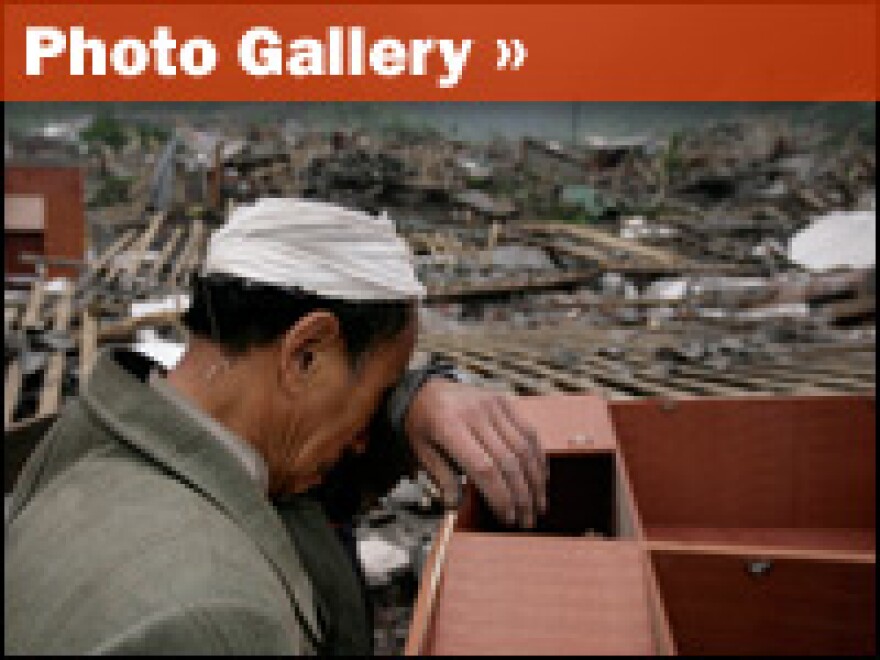

As we drive up a mountain road, the destruction caused by yesterday's earthquake grows visibly worse. First we see roofs violently stripped of their tiles, then a few houses that have caved in in the middle; still farther, massive boulders, 10 or 12 feet in diameter, that have rolled down the mountain and blocked half the road.
Everywhere you look, people are living out in the open in heavy rain. Families have pulled mattresses outside; they're sleeping under tarps and umbrellas along the side of the road. With aftershocks still rumbling, no one wants to be inside.
Finally, we come to the village of Ganxi, a tiny strip of homes, many now pulverized by the earthquake. But as devastated as this village is, it has become a place of refuge for those fleeing villages in far worse shape.
We come across 14-year-old Zheng Mingzhong. He's hobbling down the road, leaning on a tall bamboo stick. His left foot is swollen and angry, covered with large pustules. He was hit by falling bricks when his house collapsed.
He says he fled his village with his grandmother. He walked three or four hours on his crushed foot, then hitched a ride on a motorcycle at the very end.
In Ganxi, the boy is carried to a crude clinic. The village doctor puts antiseptic on his foot and lances his horrible wounds. But he says there's a fracture. The boy will need more medical care somewhere else. How he'll get there is anyone's guess.
There's a steady stream of people trudging down this road into the village.
I find 36-year-old Zhao Rong as she crosses a bridge into town with four children, ages 9 to 15, streaked with grime.
She tells me they've walked about 20 miles from their town. Incredibly, she's wearing black heels, muddy from the journey. They've come with just the clothes on their backs.
Through a translator, she says they have lost everything; they have nothing. Her wrist is swollen. But she says there is not enough medicine and not enough medical staff. And it's not just her injury. One of the young boys has a badly bruised and puffy eye. He was hurt when he escaped from his school as the quake hit.
Zhao Rong lived in the town of Chen Jiaba, in Beichuan county.
She says, "When the earthquake hit, we saw lots and lots of houses collapse, and the dust was everywhere from the collapsed buildings. I felt like I was walking through a cement factory. I couldn't open my eyes or my mouth."
She says her town used to have 15,000 people. She thinks one-third of the population may have been killed in the earthquake. That would be 5,000 dead in that one town alone.
She says, "Everywhere, there were people lying dead or injured. It was terrifying."
Zhao Rong says huge boulders rolled down the mountain, from landslides caused by the earthquake. Those boulders have filled the local river, and now the people are afraid of flooding.
She says she doesn't know where she will go — that she will live life like a beggar.
As we talk, trucks and buses drive by, carrying other villagers out and away to areas not flattened. The scope of the devastation in these rural areas is still incalculable. But the relief effort seems to be ramping up.
On the main highway heading out of the provincial capital, we pass convoys of huge bulldozers on flatbed trucks — and a long line of buses filled with soldiers. They're headed into the ruined areas to help with rescue and relief.
Copyright 2023 NPR. To see more, visit https://www.npr.org.



